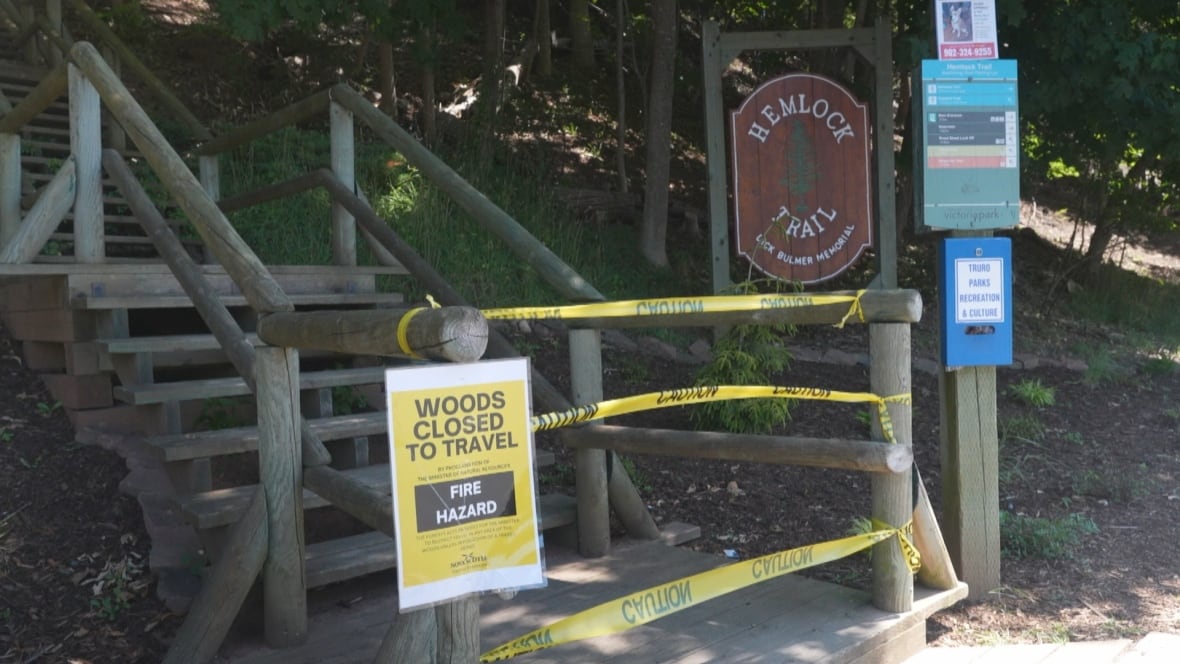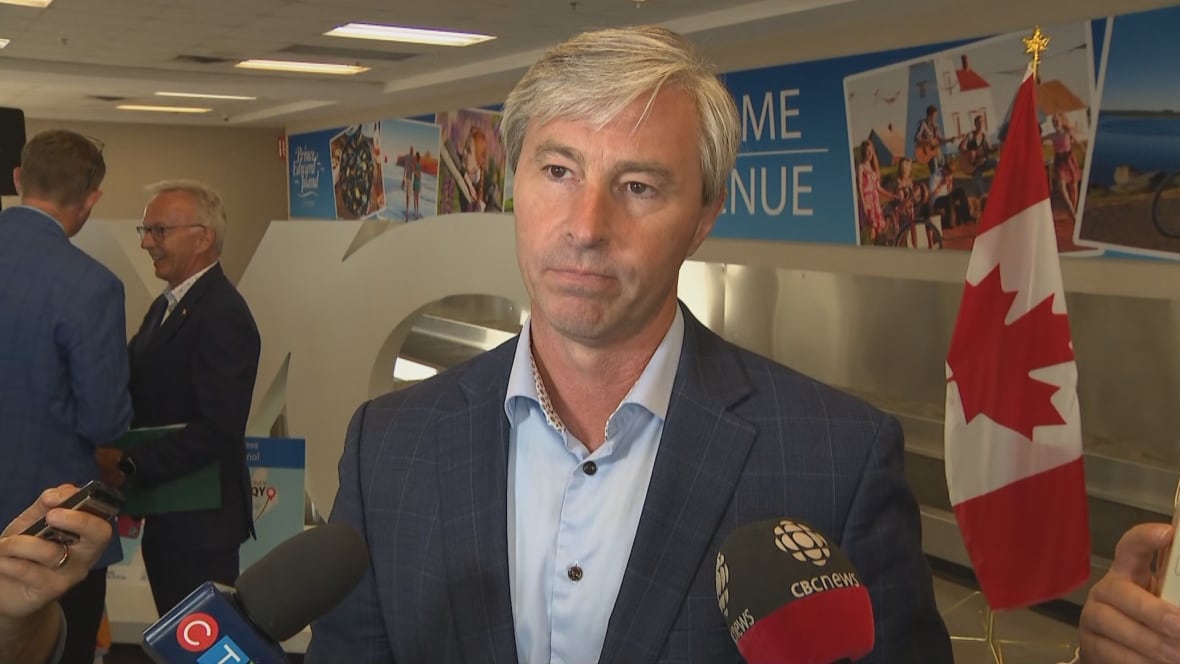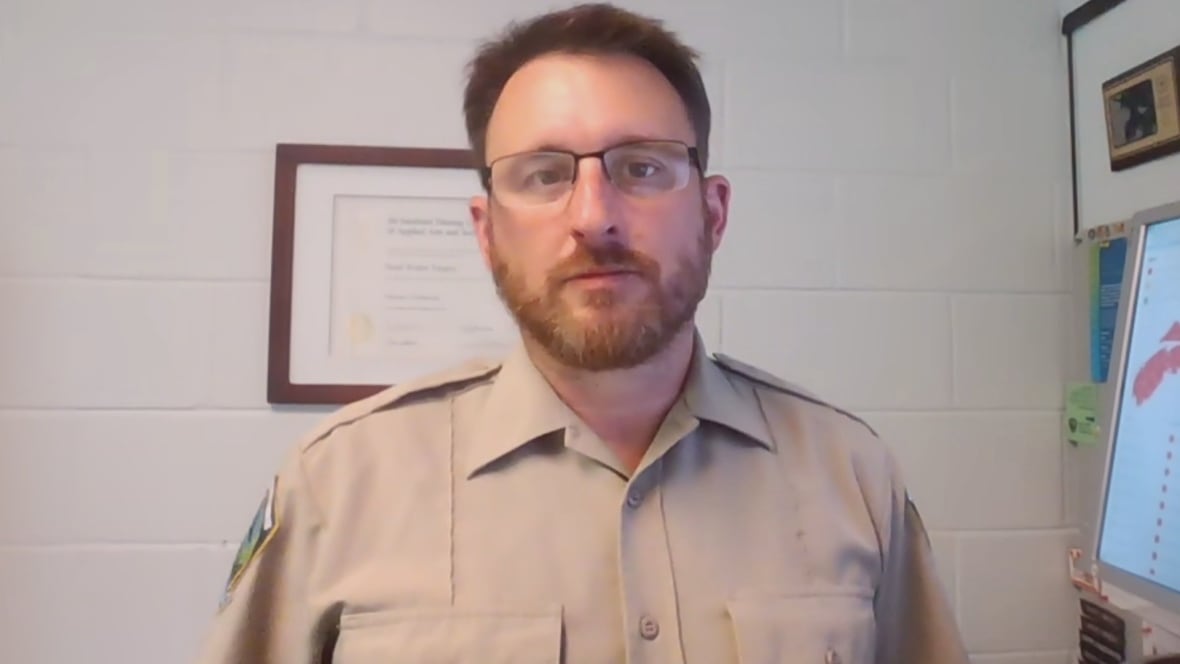[published_date]
Critics of a drought-driven woods ban in Nova Scotia say it’s an instance of government overreach.
Provincial officials say the ban — which came into effect Tuesday and prohibits hiking and camping in the forest — is necessary given hot, dry conditions throughout the province and the heightened risk of wildfires.
“I don’t think it’s reasonable to restrict people from going into the woods at all. I don’t think that it’s reasonable to put a blanket ban on outdoor activity, especially activities that don’t pose a fire risk,” Julissa Stewart of Louisdale, N.S., told CBC News in an interview on Thursday.
“You know, it’s one thing for somebody to go outside and light up a cigarette and throw a butt on the ground. It’s another thing for somebody to want to take a hike in the woods.”
Stewart feels the ban violates the Canadian Charter of Rights and Freedoms. She has started a public call to action to see who might be interested in supporting her in bringing the issue forward to initiate a Charter challenge or constitutional question.

She has also reached out to the Justice Centre for Constitutional Freedoms and the Canadian Constitution Foundation. The latter is circulating a petition to have the ban rescinded and the woods kept open.
Since the ban went into effect, Stewart says she can’t take her puppy for a walk on a trail near her home. The fine for breaking Nova Scotia’s woods ban is $25,000.
While Stewart said she isn’t opposed to restricting fire-risk activity due to the conditions, “to put a ban on everything going into the woods, to me, that’s extreme overreach. I think that is overstepping on mobility rights.”
Stewart isn’t alone.
Concerns for people sleeping rough in forested areas
In a recent social media post, Dalhousie Legal Aid wrote that it had concerns with the woods ban and its impact on people sleeping rough in forested areas.
It is urging the province and municipalities to “respond with care and to uphold the dignity and rights of those most affected.”
The group also pointed out that past court cases have shown forcibly removing people from spaces without providing a meaningful alternative can cause serious harm and could violate a section of the Charter.
Woods ban pushback not surprising, legal expert says
Wayne MacKay is professor emeritus of constitutional law at Dalhousie’s Schulich School of Law. He said he’s not surprised that some people are thinking of challenging the province’s ban because it is a significant restriction on people’s liberty and mobility.
He said all Charter rights are subject to reasonable limits. In this case, the policy objective is to prevent or at least reduce the number of serious forest fires.
“It’s a pretty compelling objective. And then the only real question becomes, is it proportionate?
“Is what they’re doing restricting more than is necessary to achieve that objective? And that’s really a kind of factual debate that would go on in the court challenge,” MacKay said.
“Is this the kind of thing that’s really needed to achieve the results which everybody wants, which is to limit or eliminate forest fires before they get started. But is this the necessary way to do it, or does it sacrifice too much in doing it?
“Almost certainly that would be the Charter question that would be raised, and it’s hard always to predict what a court would do with that.”

Restrictions could be broader than necessary
The Canadian Civil Liberties Association says the restrictions appear to be broader in scope than required.
“In the event of a legal challenge, it will be up to the province to demonstrate that the measures chosen to achieve its objective are necessary and infringe as little as possible on the rights guaranteed by the Canadian Charter of Rights and Freedoms, failing which these measures will be invalidated by the courts,” association lawyer Anaïs Bussières McNicoll said in a statement to CBC News.
Houston responds to woods ban criticism
Speaking to reporters at a news conference in Charlottetown on Friday, Premier Tim Houston briefly addressed criticism of the woods ban.
“Conditions are really dry, there’s no rain in sight, the risk is extremely high in Nova Scotia. Just a couple of years ago, we had devastating fire impacts, loss of homes, loss of properties,” Houston said.
The ban, he said, came as a result of expert advice.

“The experts came to me and said their recommendation is we should restrict travel and put some serious fines on there to keep people safe, to keep properties safe and to really just support our firefighters and first responders,” he said.
“So the experts gave the advice, I agreed with it. I’m happy to make sure that we’re doing everything we can to protect people, to protect property and try to just get through this fire season and really just pray for rain.”
Nearly all wildfires in N.S. started by human activity: DNR
Scott Tingley, manager of forest protection with the Department of Natural Resources, said conditions are “as dry as we’ve ever seen,” and drier than 2023 when two devastating wildfires broke out near Halifax and Barrington Lake, Shelburne County.
Unlike other provinces that see more fires started by lightning strikes, Tingley said nearly all wildfires in Nova Scotia are the result of human activity.
“That’s why we can’t run the risk of having people in the woods, because when people are in the woods, even if they don’t intend to, we will have fires,” Tingley said Friday.
Since the ban began, he said his department has been “very, very busy” with enforcement and following up on complaints.

‘We need everybody to pitch in’
There was considerable confusion in the first few days as people tried to figure out what they could and could not do, Tingley said, but “more and more people” now understand the risks and are following the rules.
Although Natural Resources and municipal crews across the province are still seeing fires popping up in wooded areas, Tingley said he is hopeful that number will “drop off to zero” over the coming days.
“That’s obviously what we want to see,” he said.
“We absolutely need everybody to pitch in, because that’s where we’re at … right now, in these conditions, there is a very significant risk of an uncontrollable fire starting.”
The last time Nova Scotia had substantial rain across the province was in early June. CBC meteorologist Ryan Snoddon says our next chance of rain likely won’t come until late next week.




